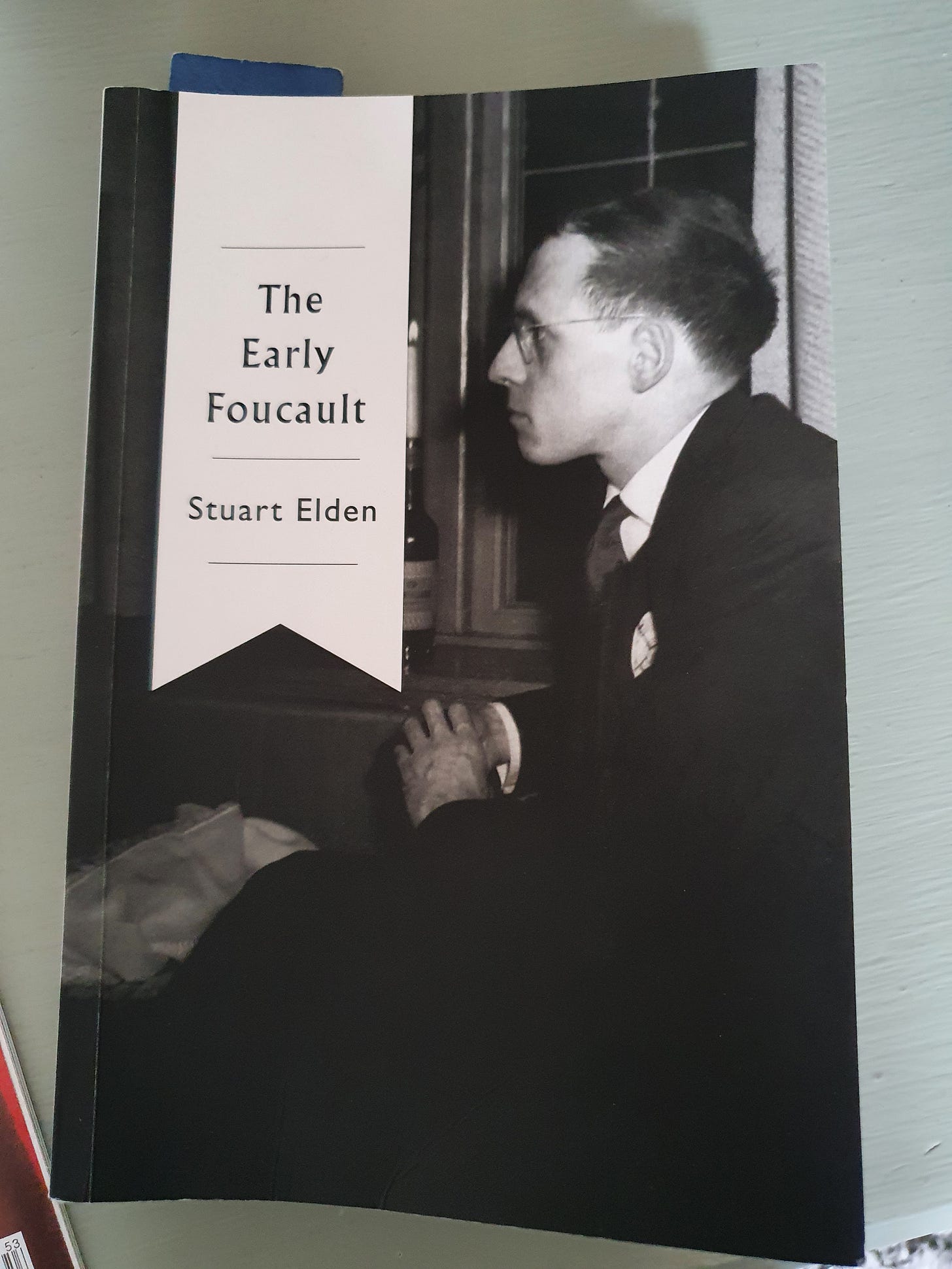The making of Foucault
How do thinkers happen? We can start with a quite obvious negative. It would seem that they don't arrive fully formed or with a preset direction to their thinking. It is tempting to imagine that they do, especially for those figures we most admire. We might like to imagine them as knowing exactly where they were heading, from the outset. It is comforting to think of thinkers as being assured and as having both a plan and a cast iron sense of direction. This assumed assuredness lends a sense of inevitability to their ideas. Of course, despite any impressions we might cling to they are much more likely to bump against options, to equivocate and to steadily find their feet. Thinking is contingent, it is shaped by circumstance. And not every avenue is followed. Thinkers leave untrodden paths along the way and may even have some doubts too. Even Foucault.
In a series of books published over the last five years, Stuart Elden has been meticulously sifting his way through the writings, lectures, notes, letters and other archival miscellanea of Michel Foucault. The results are expansive and full of insight, telling us of the ideas whilst also giving glimpses into the working practices through which they were made. The four volume intellectual history of Foucault that he has been working on, with three volumes published so far and a fourth in process, has been built out of a mass of traces. A prolific writer and worker like Foucault leaves much to explore and many narratives to question.
Reading Elden's most recent installment in the series, The Early Foucault, is to be mesmerised by sheer detail. Focusing on the 1950s, a period before Foucault was established, Elden is deep in the archives. From amongst the dusty files, the book gives glimpses behind the curtain. As well as reading across different editions and versions of published works it also layers-in the type of insights that can only come from opening boxes and handling papers. At one point, for instance, Elden noticed, contrary to what is often thought, that Foucault was actually working on Nietzsche as far back as the mid 1950s - this is a discovery that is made due to some notes scrawled on the back of an early draft version of another piece of writing. This is one amongst many such moments. As a result, most of the book's content is totally fresh, even to those who have read Foucault. It also means that it could be read by someone with no interest in Foucault but who is interested in writing, theory and the emergence of thinkers. By focusing on the period before Foucault’s well-known works, and during a time when there were few publications to work with, the archive has been allowed more space than in the previous volumes. The consequence is a rich engagement with the inner workings of ideas. The more archival focus of this book gives it even more of a backstage view on proceedings.
As well as telling us about Foucault’s early forays into ideas, the book implicitly poses the question of where ideas come from and how theorists become theorists. Bringing the scaffolding of Foucault’s thinking into view, this new volume is likely to alter how people read and interpret Foucault, not least because it situates his later famous outputs into the shoots and roots of this early period. This is a book of foundations, a story of research choices and the initiation of ideas. As Elden explains, Foucault didn’t publish a great deal in the 1950s but he was working constantly on a range of projects, not least his major work on the history of madness. This book shows how Foucault built the foundations for that major intervention.
Reading through its pages and considering its approach, it might also cause us to reflect on the status and politics of detail. The details incorporated here will change the way that the more familiar outputs will be seen, they will also cause all sorts of reassessments. Unearthing these details will ripple outward into the reading of Foucault and might lead us to wonder how the history of ideas does not just tell us of the past but makes that past active in the ongoing reception of thought and of thinkers. And then we might wonder if the presentation of such detail could even mean that Foucault’s already challenging and variable lines of argument will become even harder to access. Adding more detail may serve to increase the complexity rather than somehow lead to resolution. The weight of the detail may backload more layers of complexity into the major works. Might Foucault become a harder read?
The cover carries a rare image of Foucault with hair. It's a suggestive image, not least because it hints at the transformations that will follow. Foucault's appearance altered as he became established, becoming something of an iconic visual brand. I understand that the shaving of the head took place somewhere in the 1960s - perhaps in the fourth and final volume Elden will unearth a hairdresser’s receipt or some other note or letter that will give us the exact timing. I like to think of Foucault as a reverse Samson. That image is dashed a little here as the culmination of this book would suggest that he was producing major works prior to the change of hair. For the moment it is enduringly interesting to read of how Foucault became Foucault. In particular, Elden’s book tells the story of the different paths that Foucault could have taken in those formative years. You can also see the influence of the different figures that Foucault encountered, especially as his interdisciplinarity evolved.
The book returns periodically to this theme of the paths not taken during these early years. Around the mid-point of the book Elden surmises that ‘the unpublished texts, the lectures, and the publications give a different sense of Foucault’s breadth and depth, of multiple possible projects, of paths not taken, as well as many of the themes of Foucault’s later career’. Returning to our opening question, it seems that thinkers are made through the choices of the paths taken. Foucault might, for instance, have dug further into reading and writing directly on philosophical texts, something he was partial too but never pursued, instead of following his alternative projects. We might only wonder what such a choice might have meant for the impact he were to have. It does seem that refusing certain pathways was a key part of how Foucault became Foucault.
Reading The Early Foucault also reminded me of a previous book in the series, Foucault’s Last Decade, which tells the story of Foucault’s final works. That book also suggested that Foucault changed direction and replanned his research on a number of occasions, with shifts coming as his ideas developed and as the research he conducted led to shifts in his perspective. Foucault may have become more established and may have settled into his mode of working and thinking by the late 70s and early 80s, but even in those later years he was still exploring possible paths and dead-ends before finding the means and space to work things through. There were different directions that his last major project could have taken, with different planned book titles and so on. So there is something of an underlying pattern here. By carefully unpicking Foucault’s plans and outputs across this multi-volume account of his entire career, the unstable, contingent and relational nature of the subject's research and writing rise to the surface as a by-product. It seems even Foucault had moments of uncertainty and moments when the plans had to be revised, changed or even abandoned. By tracking the history of the development of Foucault’s writings and ideas Elden brings to the surface something of the practice of research. He has also, inadvertently perhaps, managed to bring out Foucault’s apparent sense of doubt in what he was doing. Perhaps there is something implicit in the approach taken to these explorations of Foucault that reveals the uncertainty and unpredictability of research and ideas.
As much as being a book of traces and pathways, it is also a story of influence. The Early Foucault is full of those who left an impression on Foucault, including both those he read and those who he was taught by or interacted with. These figures make interventions throughout the story, from job relocations to thesis examinations and on to publishing opportunities. The chapter on Foucault’s experience of reading Nietzsche is particular revealing in this regard. It captures Foucault’s wonder at the questions he was faced with, it also captures the disruption of reading Nietzsche. Elden’s usual critical eye is exercised here too, reading across the archival sources to question received ideas of when and how Foucault might have encountered Nietzsche, as well as which texts and what versions. Yet there remains a feel of Foucault’s exuberance at discovering Nietzsche, despite the careful caveats that Elden includes.
This book can be read as part of the broader project of which it is a part. A comparison of the way Foucault worked between different parts of his career becomes possible as the volumes are published. Elden brings in biography, but there is no intention of knowing Foucault. Neither is there an attempt to systematise Foucault’s thinking. Any periodisation or a singular career narrative are actively avoided, and there is no attempt to treat Foucault’s ideas with labels or types. I suspect one book rather than four would have been chosen if any of those were the objective. Instead these books reason with Foucault and bring out his own internal logics. Inevitably, Foucault’s ranging ideas draw Elden across a wide and voluminous terrain. Outside of this work on Foucault, Elden has also written on territory. That work questions conceptions of the bounding of space. This work on Foucault experiences the very thing that that other work seeks to analyse. Foucault’s boundaries, made up of paths taken and otherwise, make for a widely touring intellectual history. The lack of a central motif makes it all the more rewarding, especially as the details within it tell us not just what was thought but also how a thinker builds-up those thoughts.
Thinkers, we might conclude, are made through their choices and selections as well as the creativity they exercise within those limits. In Foucault’s case he also seems keen to strike his own narrative about his intellectual biography. Elden’s work takes us beyond such narratives. There are moments when Elden ends up picking apart Foucault’s attempts to tell the story of his own ideas. Often deploying close textual analysis and some careful detective work, Elden seems to be partially removing the fourth wall, showing a thinker at work on their own ideas. The Early Foucault might not tell us in definitive terms about how Foucault happened, no book could do such a thing, but it gives plenty of insights into the emergence of his ideas and the shutting-down of paths that were not trodden. In the background of the pages of this book we can hear Foucault whispering the word “no” as he carefully weighed up the options that opened-up in front of him and as he decided which ones to reject.




